"Improving logistics is our bread and butter," says John Kowarsky, CEO of Cargolite®. Eight years ago, Cargolite introduced their packaging concept. First in Kenya, and three years later also in other countries. In March, they presented their latest innovation, the Slimskid. With the Slimskid, Cargolite aims to optimize cut-flower shipping by increasing the capacity of flower pallets. The Slimskid is designed to replace wooden skids. In this article, John Kowarsky and Amnon Zamir (responsible for R&D at Cargolite), tell us more about this product and how it fits into the Cargolite concept.
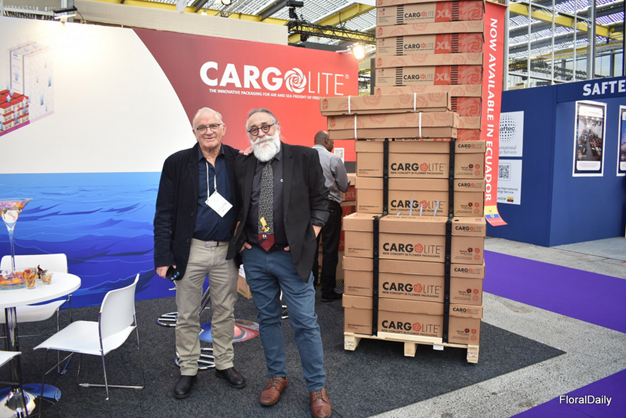
John Kowarsky and Amnon Zamir
The Cargolite concept
Cargolite provides a packaging system which aims to address several challenges that are common in flower logistics. The company's patented cartons either have an external or internal skeleton that supports the weight of the boxes above. Kowarsky says: "Since the weight is not carried by the carton walls or the flowers, the cartons don't crush and can't be overloaded. In this way, the skeleton diminishes flower damage. In addition, the cartons feature handles that allow the cartons to be held horizontally to minimize the shifting of flowers inside the boxes." However, the Cargolite team did not only want to find a solution to the challenges of box crushing and flower damage, they are also keen to reduce airfreight costs. "Thanks to their skeleton, Cargolite boxes are lighter and don't need packing materials such as SFKs, laminas or separators, kraft paper or sleeves only are sufficient. As a result, there is more space left for stems inside the Cargolite cartons, and the packing becomes considerably more efficient," Kowarsky adds.
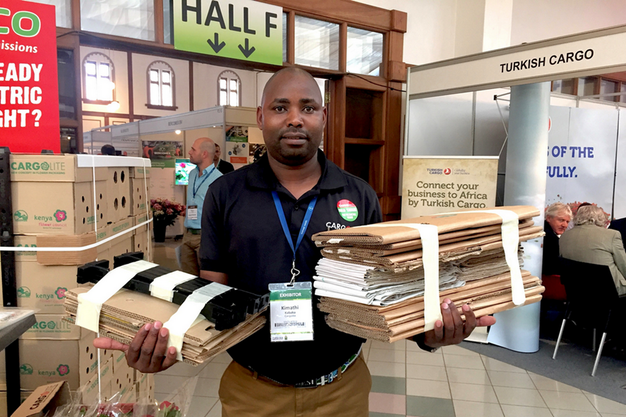
Martin Kabaka (Kenyan Sales Manager) showing the difference in weights between the two packing concepts
Over the years, more and more boxes have been added to the assortment. Originally, the Cargolite concept was a box with an external polypropylene frame. Then, they added two additional sizes, the half and the quarter box. Later, they introduced the Cargolite XL, with an internal cardboard skeleton, followed by the Cargolite SF which is particularly designed for sea freight and farm storage uses in Kenya.
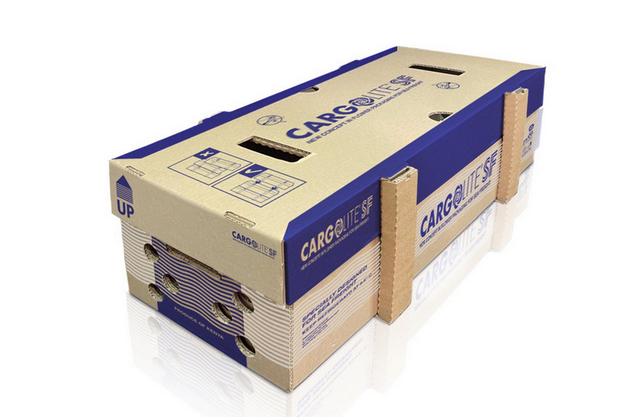
A Cargolite Sea Freight carton
Zamir highlights that Cargolite's goal is not to simply provide cartons but to offer a full-fledged packaging concept, saying: "We seek to increase the level of uniformity of packaging and pallet building: all our boxes have the same length, creating a uniform pallet. Our boxes can be compared to Lego bricks: there are smaller and larger bricks, but they all work in the same system. In the end our concept is not only beneficial for growers but also for all other stakeholders involved in the field of logistics."
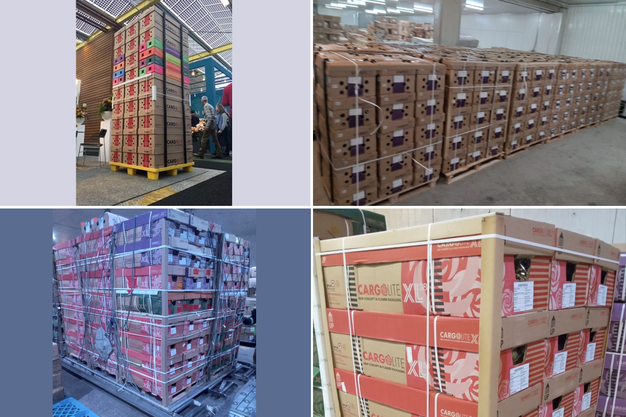
Clockwise: Cargolite quarter and half cartons, low deck pallets waiting to be loaded, a main deck air pallet loaded, and a typical low deck XL Cargolite pallet
The Slimskid
Cargolite's latest invention is the Slimskid which functions as a regular skid, however without the "voluminous and heavy" wooden skid. The goal of this product is to increase the flower capacity on the air pallet by using the space that usually remains unused when using a skid. Kowarsky explains the idea behind this product: "Usually, you put boxes on a wooden or plastic pallet. That pallet enables the logistic chain to load and offload it with a forklift. However, the pallet is heavy and has a 13-14 cm height, so unused and expensive space. What we often saw, particularly in Colombia and Ecuador, but also in Kenya, is that logistic forwarders put the boxes directly on the air pallets. In this way, they save 13-14 cm space and gain extra capacity in turn. However, the boxes are not stacked properly, they are placed directly on the floor (which may be wet), and it requires a lot of manual handling when loading and offloading. This incurs damage to the flowers due to rough handling at the airports."
Now, with the Slimskid, not only extra flower capacity will be gained, the benefits of a skid will be maintained too, he states, saying: "The new concept is very simple, and we don't see any difficulty to implement the concept at source and at destination. We will be showing the concept at the IFTEX 2024 exhibition, and we welcome you to come and see the concept working. A dedicated, easily removable simple device (with lifting straps attached to the forklift) lifts the Slimskid from above, instead of the traditional lifting from under the skid. The device places the Slimskid on or off the air pallet onto a regular skid for further processing. In this way, the expensive phase of air freighting, the 'dead weight', and the unused space of a skid is avoided.
But not only that: Since the Slimskid is less than one inch thick, the Slimskid adds only one inch to the total height of the air pallet. It allows us to replace the space used by the conventional skid (13-14 cm high) with more flower boxes, adding 10% more to a lower deck skid of 160cm high with the use of our Cargolite Halfboxes, which are 14cm high. All that saves a lot on airfreight costs while conserving the logistical benefits of the conventional skids in the airborne phase of the supply chain. In other words, the Slimskid has the same logistic properties as regular skids. However, the Slimskid is more compact, lighter, reusable and easier to store."
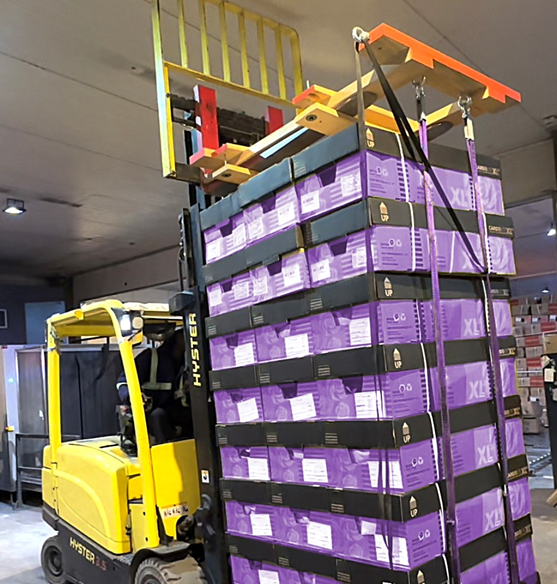
The SlimSkid being used to offload an air pallet
Versatility
Zamir points out that the Slimskid can be used in Kenya, Latin America, and that it has potential in Europe and the US as well. "In Kenya we always encourage building the Cargolite concept on pallets at the farm because they can be scanned as a whole at the airport. However, when using the Slimskid, they can now easily add extra flower capacity. The only change they need to do is laying the wooden boards on top of the pallet. Then, when loading the boxes onto the air pallet, the Slimskid enables them to pick the boxes with the straps with a forklift and place it on the air pallet, leaving the skid behind. At the destination, another forklift can easily pick up the boxes, which reduces expensive manual labor."
At Cargolite, they find that the logistic chain in Latin America can also benefit from the Cargolite and Slimskid concept. "Unlike in Kenya, they build the air pallets box by box as these boxes need to be scanned one by one. However, when using the Slimskid combined with the Cargolite concept, the flowers and workers are not the only ones benefitting from the Cargolite concept. Namely, at the destination, the boxes can be easily offloaded with a forklift, reducing manual labor."
He concludes: "The concept, of which is patent pending, may sound so easy but the actual design entails several challenges. Last February, I was in Kenya to trial the prototype of our system, to make sure that it works for forwarders. They didn't see any objections. Now the next step is to do the actual shipments. And in March, we presented the Slimskid in Miami to about 30 USA importers, who import flowers from Colombia and Ecuador. Also here, reactions were very positive.
IFTEX
Eager to learn more about the Cargolite and Slimskid concept? At the IFTEX, that will take place in Nairobi, Kenya, from June 4-6, Cargolite will present the Slimskid and the new sea freight carton at their stand, number G3.21.
For more information: 
Cargolite®
John Kowarsky
Tel.: + 972 52 3282100
Email: [email protected]
Amnon Zamir
Tel.: + 972 52 6383737
Email: [email protected]
Martin Kabaka
Tel.: +254 722 309 318
Email: [email protected]
www.cargo-lite.com
